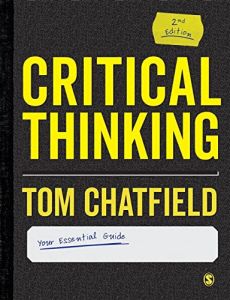Join getAbstract to access the summary!

Join getAbstract to access the summary!
Tom Chatfield
Critical Thinking
Your Essential Guide
SAGE Publications, 2022
What's inside?
Never before have critical thinking skills been more crucial, as humans navigate a sea of overwhelming information.
Recommendation
How can you be reasonable in an unreasonable world? In this comprehensive guide, tech philosopher Tom Chatfield offers an answer to this question, with thinking concepts crucial for both students and professionals. Particularly useful to future academics, the workbook format keeps the material engaging and relevant. Using real-world examples with corresponding exercises, Chatfield makes complicated theories accessible. He’ll help you learn how to critically evaluate information and challenge you to build solid arguments, while also providing guidance in attention management and digital engagement.
Summary
About the Author
Tom Chatfield is a tech philosopher, broadcaster, speaker and columnist.





















Comment on this summary